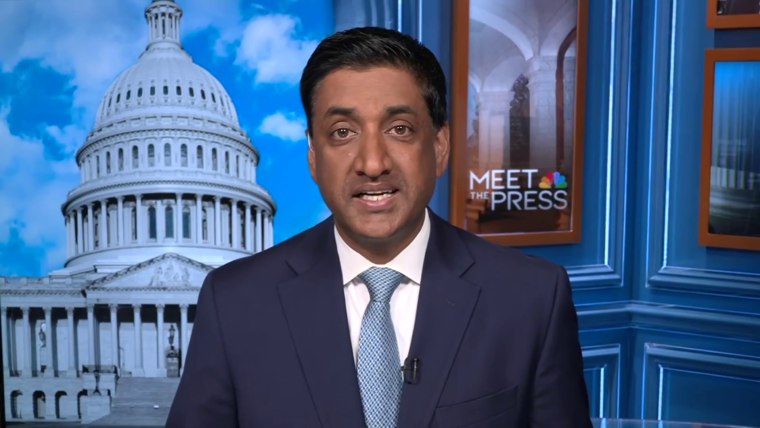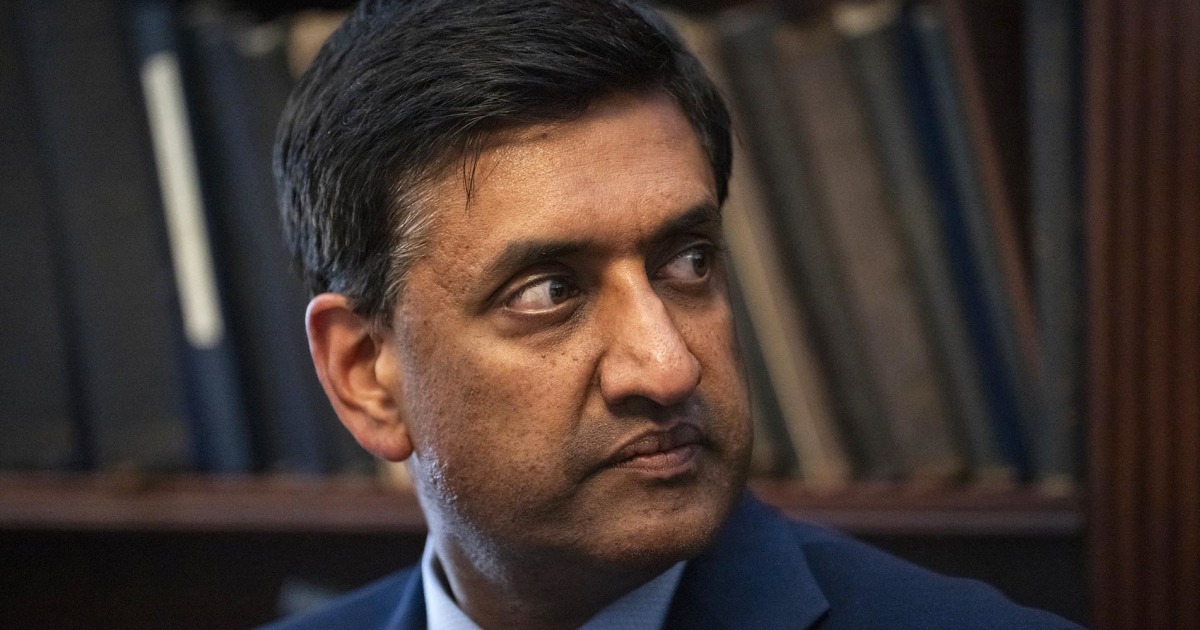WASHINGTON — With a near-unanimous vote in Congress to pass his bill requiring the release of Jeffrey Epstein files, Rep. Ro Khanna, D-Calif., can claim a victory that no other Democratic presidential prospect has achieved: cracking the MAGA coalition.
Early polls suggest he’d be a heavy underdog if he runs. But the California Democrat has been traveling to swing states and early contests to test the water for a possible White House bid.
Khanna, 49, teamed up with Rep. Thomas Massie, R-Ky., to introduce the Epstein Files Transparency Act in July. The bill requires the Justice Department to release its records related to Epstein, the late financier and convicted sex offender who had connections to a number of powerful figures, within 30 days.
Khanna and Massie attracted Republican co-sponsors and just enough signatures to end-run House GOP leaders and force a vote, with MAGA luminaries such as Republican Reps. Marjorie Taylor Greene of Georgia, Nancy Mace of South Carolina and Lauren Boebert of Colorado supporting the measure.
It was a rare bipartisan feat, made more difficult by President Donald Trump, who pushed for months to dissuade Republicans from joining the effort. But in the final days, Trump bowed to what increasingly appeared to be an inevitability, flipping his stance and backing it. Party leaders followed him. Every Republican except one joined unanimous Democrats on Tuesday to vote for the measure on the House floor, sending it to the Senate, which passed it unanimously.
In an interview in the speaker’s lobby moments before the House vote on his bill, Khanna told NBC News his project contains the building blocks of a national vision.
“Whatever role I have, I hope it’s a role in shaping the national future of the Democratic Party and the country,” he said. “We need to build an enduring coalition around a vision of new economic patriotism that can unite the left and right. And the elements of that are to rail against an elite governing class that has created a system that’s not working for ordinary Americans. And then to offer a concrete vision of how we’re going to prioritize the economic independence and success of those forgotten Americans, as opposed to just this billionaire elite class.”
He melded the new effort into his larger left-right message, attacking “the Epstein class that has accumulated power and doesn’t play by the rules and has impunity at the expense of ordinary Americans.”
Khanna’s approach is unique among Democrats. He doesn’t quite have the fiery rhetoric of other rumored White House hopefuls such as California Gov. Gavin Newsom and Illinois Gov. JB Pritzker, and he doesn’t have the iconic progressive image of New York’s Rep. Alexandria Ocasio-Cortez.
Simply put, his willingness to partner with MAGA figures who are detested by liberals may not be a selling point for an angry and fired-up Democratic base.
“That’s a criticism I sometimes get,” Khanna quipped.
Still, the California Democrat shows his sharp elbows against Republicans at times, most notably positioning himself as a foil to Vice President JD Vance, who’s seen as a potential Republican front-runner in 2028. He’ll often go after him on social media. During a speech in April at Yale Law School, where both Vance and Khanna received their degrees, Khanna drew a comparison between the vice president and Soviet dictator Joseph Stalin.
Vance’s office did not return a request for comment.

Khanna lacks the national name recognition of other Democrats, including Pete Buttigieg, a former presidential candidate and transportation secretary in the Biden administration, who has also been viewed as a potential 2028 candidate.
Not since the 1800s has a House member ascended straight to the presidency; and as an Indian American, Khanna would be looking to make history in more ways than one.
But what he has built is a level of trust among Republicans who wouldn’t work with other Democrats. He said he’s done that by “being civil to colleagues” — including some hard-right Republicans — and building trust and partnerships with them, giving them credit, taking his message to “Republican-leaning podcasts” and “treating MAGA voters with respect.”
“I have not gotten into Twitter wars with Marjorie Taylor Greene or Lauren Boebert. I have a real friendship with Thomas Massie,” he said. “They trusted me enough not to make it about Donald Trump — from day one, any press conference we did, anything we did, we talked about it being about the survivors, not political.”
Khanna said his insistence on seeing the humanity in those GOP lawmakers, who are top Democratic foes, was key to success.
“It was the whole thing,” he added. “If I had engaged in those kind of meme wars and others, there’s no way Massie would have worked with me.”
The White House downplayed the Khanna-Massie effort, despite the president fighting it for months, saying Trump had already been “calling for transparency,” on the Epstein files “and is now delivering on it with thousands of pages of documents as part of the ongoing Oversight investigation.”
Khanna has a different vision of bipartisanship than other Democrats, including former Presidents Joe Biden and Barack Obama, who sought to find the most moderate Republicans and work with them on noncontroversial goals. By contrast, Khanna tends to look for GOP lawmakers to partner with on populist issues that both the left and the right can sell as a rebuke of an entrenched establishment.
He has teamed up with Rep. Don Bacon, R-Neb., to repeal Trump’s tariffs on coffee, and with Reps. Brian Fitzpatrick, R-Pa., and Jodey Arrington, R-Texas, to propose congressional term limits. He worked with Republicans to advocate for reining in the government’s warrantless surveillance powers under FISA Section 702 and to prevent U.S. military intervention in Yemen.
Massie said Khanna’s approach was instrumental in the success of their Epstein measure. He said he saw an opening when Khanna offered an Epstein amendment in the Rules Committee, and “got every Democrat and one Republican to vote for it.”
“Ro gave me the idea, whether he meant to or not,” Massie said. “He’s able to put aside the partisan bomb throwing in order to work across the aisle, and he’s really good on TV.”
“He was an important element of this,” the Kentucky Republican said. “And it was his idea, really, to organize the survivor press conference. So I don’t know if it would have succeeded with any other Democrat on the other side of the aisle.”
Others have nothing to say about Khanna, including Rep. Keith Self, R-Texas, who replied, “No comment,” when asked about his role in the Epstein bill.
On the House floor before the vote, Khanna thanked his Republican partners on the bill.
“The Epstein class is going to go,” he said. “And the reason they’re gonna go is the progressive left and the MAGA right and everyone in between is finally waking up against this rotten system.”
In the NBC News interview, Khanna repeatedly invoked President Franklin Delano Roosevelt as a guidepost for his populist views and desire to take on wealthy interests, while conceding that his progressive ideals won’t fully upend the MAGA coalition. But he believes he has a better theory of how to engage those voters than some recent — unnamed — Democratic presidential prospects.
“Do I think somehow we’re going to win all of Trump’s voters? No. I’m not naive,” he said. “But I think that that has a better shot of winning than we’re just going to do Infrastructure 2.0.”
This article was published by NBC News on 2025-11-19 13:47:00
View Original Post





